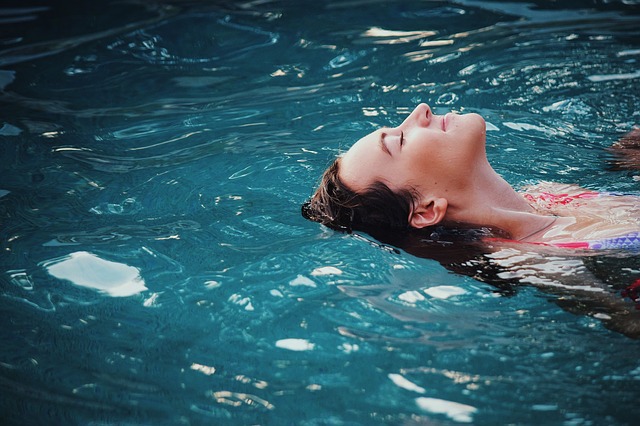Do you spend a lot of time in the pool or hot tub? Does your tap water contain heavy amounts of chlorine? This chemical can wreak havoc on hair, so it’s important to know exactly what it does and how to combat it. Don’t worry, you don’t need to stop swimming!
Getting chlorine in your hair once in a blue moon won’t do much to it, but if you are regularly exposed to this common chemical, you’ll find that it can really affect your hair. It can damage hair, causing it to dry out and become very porous. This means that any copper in the pool can bind to your hair shaft and create that dreaded green color that people talk about.
What is Chlorine Damage?
Chlorine is a common chemical found in swimming pools and other water sources, and it can have a significant impact on the health and appearance of your hair. Exposure to chlorine can cause the hair to become dry, brittle, and prone to breakage. This is because chlorine can strip the natural oils and moisture from the hair, leaving it dehydrated and damaged.
In addition to causing dryness and damage, exposure to chlorine can also lead to discoloration and changes in the texture of the hair. Over time, chlorine can cause the hair to take on a greenish tint, particularly for individuals with blonde or light-colored hair. This discoloration occurs when chlorine reacts with copper or other metals in the water. Furthermore, repeated exposure to chlorine can cause the hair to become increasingly brittle and fragile, increasing the risk of hair breakage and hair loss. To minimize the potential risks of exposing hair to chlorine, it is recommended to rinse the hair with fresh water before and after swimming, wear a swimming cap, and use hair products specifically designed to protect and nourish the hair from chlorine exposure.
Is Your Hair Extra Vulnerable?
Some hair is more vulnerable to chemical damage. If you have dyed or highlighted your hair, it’s already damaged and can be further destroyed by chemicals. In fact, any hair that has previously been damaged through heat or chemicals (such as permed or chemically straightened hair) will be more susceptible to chlorine damage.
Naturally dry or thin, fine hair is also damaged easily. However, there’s good news. You can prevent and even reverse the damage done to your locks by that harsh pool water.
Preventing the Damage
The best way to avoid damaged hair is to prevent it in the first place. The simplest method is to wear a bathing cap to protect your hair against the chlorine while you’re in the pool. If you can’t use a cap, soak your hair with clean water before swimming. Saturated hair won’t absorb chlorine water.
As soon as you get out of the pool, you should rinse your hair for several minutes under clean water. This helps remove the chemicals that may be clinging to it. You can also wash your hair with a shampoo that is specially formulated for swimmers, though any shampoo will help remove some chemicals. Swimmer’s shampoo will neutralize the effects of the chlorinated water.
Simple Ways to Prevent Chlorine Damage:
-
Rinse your hair with fresh water before and after swimming to help minimize chlorine absorption.
-
Wear a swimming cap to protect your hair from direct contact with chlorine.
-
Apply a leave-in conditioner or hair oil before swimming to help protect the hair and keep it moisturized.
-
Use a clarifying shampoo after swimming to help remove chlorine buildup from the hair.
-
Avoid using hot water when washing your hair after swimming, as this can further dry out the hair.
-
Apply a deep conditioning treatment to your hair once a week to help restore moisture and prevent damage.
-
Consider using a hair mask specifically formulated for chlorine-damaged hair to help repair and nourish the hair.
-
Limit your exposure to chlorine as much as possible by avoiding swimming in heavily chlorinated pools and opting for natural water sources such as lakes or rivers when possible.
Reversing the Damage
If your hair is already damaged, you can often fix it by trimming the hair to remove damaged ends and use a clarifying shampoo on it. This will remove the buildup of chemicals on the hair shaft. Don’t have clarifying shampoo? Just use apple cider vinegar to soak your hair and remove any chlorine that has built up.
Protein treatments and deep conditioning treatments are also useful in repairing chlorine damaged hair. You may still see some signs, but you’ll find your hair is much healthier after these treatments.
Contact Eldorado for Maryland Hair Loss Solutions
Are you suffering from hair loss? At Eldorado, we work directly with your personal hair restoration needs, from the initial consultation to the final solution. To schedule a free hair analysis call us at (410) 931-3399, or to contact us via email, click here.


